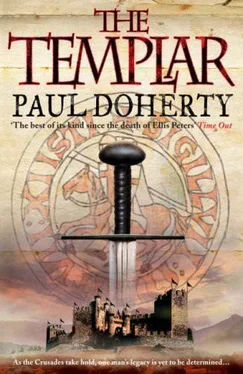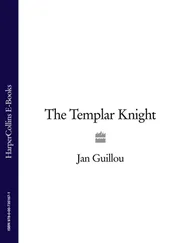P. Doherty - The Templar
Здесь есть возможность читать онлайн «P. Doherty - The Templar» весь текст электронной книги совершенно бесплатно (целиком полную версию без сокращений). В некоторых случаях можно слушать аудио, скачать через торрент в формате fb2 и присутствует краткое содержание. Год выпуска: 2010, ISBN: 2010, Издательство: Minotaur Books, Жанр: Исторические приключения, на английском языке. Описание произведения, (предисловие) а так же отзывы посетителей доступны на портале библиотеки ЛибКат.
- Название:The Templar
- Автор:
- Издательство:Minotaur Books
- Жанр:
- Год:2010
- ISBN:9780312576837
- Рейтинг книги:5 / 5. Голосов: 1
-
Избранное:Добавить в избранное
- Отзывы:
-
Ваша оценка:
- 100
- 1
- 2
- 3
- 4
- 5
The Templar: краткое содержание, описание и аннотация
Предлагаем к чтению аннотацию, описание, краткое содержание или предисловие (зависит от того, что написал сам автор книги «The Templar»). Если вы не нашли необходимую информацию о книге — напишите в комментариях, мы постараемся отыскать её.
The Templar — читать онлайн бесплатно полную книгу (весь текст) целиком
Ниже представлен текст книги, разбитый по страницам. Система сохранения места последней прочитанной страницы, позволяет с удобством читать онлайн бесплатно книгу «The Templar», без необходимости каждый раз заново искать на чём Вы остановились. Поставьте закладку, и сможете в любой момент перейти на страницу, на которой закончили чтение.
Интервал:
Закладка:
Eleanor stared at the tent flap. She felt deeply uneasy about Hugh and Godefroi’s reasons for taking the cross. True, they had been crucesignati in Iberia. They revelled in the legends of Roland. They sought absolution for past sins and were tired of the jousting and the tourneying between neighbours, but was there something else? The journey to Jerusalem could be understood, but since leaving the Auvergne, her suspicion had deepened that both knights nursed secrets. What date was it now? The middle of December in the Year of Our Lord 1096. Urban had delivered his sermon at Clermont over a year ago. Yes, that was right! She and Hugh had been in Compiègne when dusty messengers brought the news. She remembered one in particular, cowl thrust back, standing in their smoke-filled hall talking about an evil Turkish prince, Al-Hakim, who had razed the Holy Sepulchre church, inflicting indignities on his own people as well as Christians. Hugh had taken up the summons fervently, but when Norbert the monk had appeared, he began to change, becoming more sombre and reflective.
Eleanor chewed on her lip and quietly rebuked herself. She should have thought of this earlier. The seeds of her suspicions had been sown ten months ago, but she’d ignored them, taken up with the excitement, the frenetic preparations and the journey south to Auvergne. Godefroi’s warm friendship had been most welcome, but again, events had been veiled by a mêlée of preparations. Yes, and something else. Alberic had been a constant visitor, often meeting Hugh and Godefroi by themselves. She recalled what she knew of the parish priest. He was undoubtedly a mysterious man, much better educated than the priests who usually served the village churches. He and Norbert appeared to be old friends. The Benedictine seemed much travelled. Was he an excommunicate monk? Someone expelled by his monastery for making trouble? Jerusalem linked them all, but what bound Hugh, Godefroi, Norbert and Alberic so closely? She had been swept up in the preparations yet she had always sensed something amiss. Hugh had become more austere, praying more often, not so responsive to the laughing glances of the ladies and village girls. Moreover, since they had left the Auvergne, he had tightened the discipline of the Poor Brethren, publishing a divine office of hours, drawing up rules about meetings, dress and even diet. But why?
The march to the borders of Sclavonia had, despite the sheer glory of the mountains, been a tiresome trudge along muddy trackways. Eleanor had had plenty of time to reflect, to become more aware of the growing secrecy around her brother. In many ways Hugh reminded her of those knights from the great romances, who pursued some glorious, mystical vision. One thing she had discovered was Hugh and Godefroi’s absorption with one particular chivalric poem: ‘La Chanson de Voyage de Charlemagne à Jerusalem’. Hugh read this constantly. On several occasions Eleanor had asked to borrow his copy, and Hugh promised he would lend it to her, but he always found an excuse not to. This poem, together with a list of relics, seemed to absorb him whenever he was not busy with the Poor Brethren or conferring with Count Raymond. Eleanor had discovered the list of relics by sheer accident. A memorandum drawn up in Count Raymond’s hand was delivered by accident to her tent rather than Hugh’s. She had asked her brother about its importance but he had dismissed it, declaring that it was simply a list of sacred items he would like to see. So much mystery!
Eleanor shivered against the cold and pulled her wrap closer about her shoulders. She was tired, eager for her narrow cot bed on the far side of the tent, yet she was determined to wait for the widow woman and resolve at least one mystery. She packed a few belongings for tomorrow’s departure. She now regretted the few luxuries she had brought. She dressed the same every day: a linen shift under a brown serge gown with a leather strap around her waist; a deep cowl sheltering her head, whilst her legs and feet were warmed and protected by woollen stockings and ox-hide boots. She also carried a short stabbing sword in a sheath, Hugh had insisted on that. She was just finishing her preparations when Imogene, escorted by Beltran, reached the tent. They whispered their farewells and Imogene slipped in through the flap. As always she carried the battered leather bag containing her precious box. Eleanor smiled; Imogene nodded and crouched over the brazier. Eleanor shook off her tiredness.
‘You were harsh against the Jews.’
Imogene simply shrugged.
‘I mean,’ Eleanor continued, ‘you are, were, of the Jewish faith.’
Imogene’s head came up; her mouth opened and shut.
‘Oh, don’t worry.’ Eleanor smiled. ‘I do not mean to threaten; you just talk in your sleep! Most of it is the jabbering of dreams, but I’ve heard you pray the Shema. You mention the name Rachel, and sometimes you chatter in a patois I cannot understand.’ She came and knelt beside Imogene. ‘Please,’ she begged, ‘no pretence, not now. You are no longer with the rest; there is no need to chant the common hymn. I am not a threat to you. Does Norbert know?’
Imogene nodded, her dark eyes never leaving Eleanor’s face.
‘He knows so much, our wandering monk.’
‘He has been to Constantinople,’ Imogene replied. ‘He and Alberic are more than what they seem; they search for something.’
‘Yes, yes, I have realised that myself, but you…’
Imogene squatted on the floor and pushed back her hood, snatching off the coarse veil beneath. ‘My birth name is Rachel. I am from Iberia on the borders of Andalus. The usual story,’ she continued in a dry monotone. ‘Portents and signs, a bad harvest, loans that could not be repaid. Of course the Jews were to blame, the usual scapegoats. My father was a merchant. He and my mother were trapped in their own house. They were burned to death along with my brothers and two sisters. I was six.’ She smiled nervously. ‘Small for my age. I escaped through a window. Night had fallen. I fled to a neighbour’s house; they were kindly. My father had always told me to trust them. They took me in and sheltered me. I later found they were Jews who’d converted. I became one of them, given a new name and a new life. The couple were still Jewish and secretly continued to practise our religion. They kept the sacred vessels and their copy of the Torah hidden away. They secretly celebrated Yom Kippur, Passover, the Feast of the Tabernacles and the other festivals. They also returned to my parents’ house and gathered what they believed to be their ashes.’
‘The wooden box contains these?’
‘Yes. I hoped to bring them to Jerusalem, a righteous act for my parents. The Christian signs on the lid are part of the pretence.’
‘And who are… what are you now?’
‘Sister, I don’t know.’
In the poor light, Imogene’s face looked younger, paler.
‘Truly I believe in nothing. Yes, that is correct.’ She laughed sharply. ‘How can I be Jewish when I believe in nothing?’
‘And why have you decided to be honest now?’
‘As Norbert says, why not?’ Imogene pulled a face. ‘After tonight’s meeting of the Poor Brethren, I met Norbert and Alberic, and they assured me I’d be safe. We have so much in common. They are searching for something, something that is true in all this horror.’
‘You know Alberic and Norbert from before?’
‘Oh yes, they are constant travellers. They crossed into Andalus and visited my foster-parents’ home. They are keen students of all things Jewish, be it the Kabbalah or the legends of the Temple Mount, the Dome of the Rock in Jerusalem.’
‘What are they searching for?’
‘God knows! Legends, relics, proof?’ Imogene shook her head. ‘They moved through the Jewish community asking questions, collecting information. I met them, and through them managed to meet my late husband Thomas, a wine merchant from St Nectaire.’ She shrugged. ‘The rest you know. I was a good wife, well respected. I settled in the area. My husband died. Urban preached his sermon at Clermont. By then, Alberic had taken the advowson of the local church. He’d been there for four years, exercising great influence over Lord Godefroi. Norbert seemed to have disappeared, then re-emerged as the Crusade was proclaimed. And then,’ her voice faltered, ‘came Anstritha, the wise woman, the one who was murdered by the mob.’
Читать дальшеИнтервал:
Закладка:
Похожие книги на «The Templar»
Представляем Вашему вниманию похожие книги на «The Templar» списком для выбора. Мы отобрали схожую по названию и смыслу литературу в надежде предоставить читателям больше вариантов отыскать новые, интересные, ещё непрочитанные произведения.
Обсуждение, отзывы о книге «The Templar» и просто собственные мнения читателей. Оставьте ваши комментарии, напишите, что Вы думаете о произведении, его смысле или главных героях. Укажите что конкретно понравилось, а что нет, и почему Вы так считаете.












